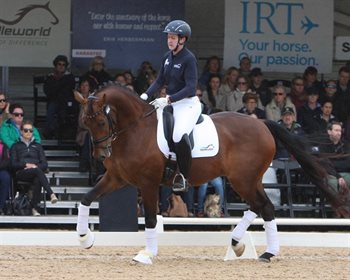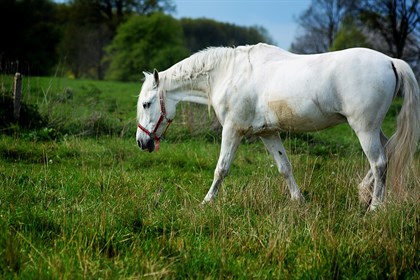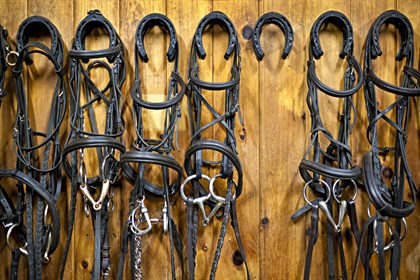|
This article has appeared previously with Equestrian Life. To see what's in our latest issue, click here.

© Roger Fitzhardinge
By Sam Cesnik
How do you get the horses ready for a competition while working full time? Ok so there is no big secret except working hard like most things! However, for me there are definitely some hints and shortcuts that can help! I have ended up doing this in two parts, first the horse then the gear!
Part one: The Horse/s
I have a process starting with making a ride plan 5-10 days out from a competition. For a 3DE it’s 10 days for a local competition it may be more like 5, here are my considerations:
When do I want to give the horse a day off? i.e. for the lazy ones they like the Thursday off for the hot ones they get a day off early in the week – Sunday or Monday so they have as much constant work as possible to keep them ‘under the thumb!’. I look at what days I need to do fitness work so it’s not too close to the competition, if they need the farrier or physio so it’s also not too close. I consider what days I have time to ride in the day light (if any!) and make sure I use the precious daylight to have a jump session. Put in any set lessons or tune ups (I prefer not to have a lesson to close and sometimes things get worse before they get better!) I consider if we need to go XC schooling. Much of this will be pre set with your competition and fitness program for the year but the actual day in which you do flat vs. show jumping and how to keep each horse happy need to be considered. Like if you have one who gets sour on the flat easily but needs to do lots of flat schooling sometimes a hack with running reins or a double bridle on can be a good way to get flat work into it without it getting so sour. Make sure if you have a horse who predicts movements in a test you don’t drill the test too close to the competition! Make sure any legal medications like pentosan or regumate are given at the optimum time in the week for your horse, I like Tuesday or Wednesday - not so close if you have a problem it can’t be addressed (i.e. a lump or reaction) and not so far off the drug activity is starting to peter off.
This helps me to know what I’m doing each day, make sure the horse and I are properly prepared and we have done the schooling close enough to the competition. It does take some trial and error to work out what pre competition program suits each horse, some people like to keep a diary so they can look for patterns in their prep. This also helps me to know what days at work I really have to leave on time and what days I can work overtime if any. If I have a big competition like a 3DE I do try to keep my co workers/manager/client informed that I have an important competition coming up so they know that when I have to go and train it’s because it’s important. I also do my fair share of staying back though so there is no ‘the boy who cried wolf’ going on. When I am away at a competition for a while if I can leave and work a day I do i.e.- at M3DE we generally have a day off so I try to go into the office that day or at least login and answer emails for a bit.
In terms of keeping the horses clean, firstly, don’t own a grey horse. I had one once, never again! If you have a fairly clean horse or it’s summer and your paddocks are pretty clean you can wash them on a Thursday rather than Friday and just give them a spruce on Saturday morning or Friday night. Paddock boots can help here too for keeping them clean as does great products for whitening legs or adding a bit of shine to slightly dusty coat. We all have our favourite products make sure you keep them handy. Keeping their manes pulled and them trimmed regularly helps too I try and have these done as part of my day to day routine rather than a ‘competition special’. This helps them stay clean and its one less thing to do on a Friday night it also means when I go to lessons they look good most of the time.

In terms of keeping the horses clean, firstly, don’t own a grey horse. I had one once, never again!
I try to grocery shop earlier in the week and be organised so I turn up with plenty of good food to eat. Anyone who’s been to visit us at a competition knows I cater for an army every time and you’ll likely get offered salad, fruit, wraps, curry, homemade slice etc..., it’s my European half coming out I think!
I’m not going to talk about managing issues in the week leading up to a competition it’s a whole blog/book of its own suffice to say you want to be on top of boot rubs, girth galls, skin irritations, knocks, bumps and little cuts more than usual. Be very across what medications/supplements swab and have a clear understanding of your calendar so you know if a competition is essential to your campaign (i.e. CIC qualifier) or you can go without or substitute the run if something does go wrong. Manage them more closely coming up to the competitions you know you have to get to.
I feel something should be said about feeding, many people change feeding regimes before a competition this is not advisable one of the key rules of feeding horses is make changes slowly - a week isn’t slow nor will it have much effect except increasing your risk of colic. What I will say is make sure they are eating their entire ration and if you have one who’s picky or doesn’t like to eat big feeds try to work out a way to get them to eat when they are in full work. Lunch can help with this as can late night feeds or feeding slightly more at night than in the morning if they eat better overnight. If you use lunch you should find you won’t have to increase the ration but they will digest it better and gain weight as a result, this in turn actually saves money and reduced ulcer risk too. What does sometimes change is supplements, make sure they are getting adequate electrolytes for instance particularly if it’s hot and you have to travel a long way. Starting your trip with a dehydrated horse is a recipe for disaster and keep an eye on their temperatures before you leave and for the duration of the competition when travelling long distances. Other supplements that may change in the lead up include calming supplements and muscle support supplements. Make sure you have tested them without an impending competition before introducing or increasing them a week or two out from an event based on professional recommendations.
Part Two: The Gear
The big key is to be super organised, I like to have a storage box for everything so I have one for all the boots and bandages with the exception of ice boots they have their own as they are big and sometimes wet. I have one for all the turn out stuff (plaiting gear and makeup) and random things like bridle numbers, bonnets, electric tape etc... one for the studs and associated equipment like spanners, WD-40 (don’t leave home without it!) etc... I have a large bag for white saddle blankets and another for float boots and yet another for cotton rugs if going on a long trip where they need to change them. I have a grooming box for brushes and creams, a first aid kit for shows with no prescription meds and lots of ‘ye old’ stuff in it like bran, oil of clove, fryers balsam and epsom salts that all comes in super useful and doesn’t swab.

I wipe over my work bridles daily - a habit from OS that I decided was a good one to keep!
I do it this way so that I always know where everything is and everything I need has a home. Also it’s easy to pack and un pack as everything has its own large carry all container of some sort. The bags come in super handy as once I have used the saddle blankets or rugs all the dirty washing goes back into the bag so when I get home I have a centralised place for the washing – makes unpacking easier. Also when I do the washing throughout the week each thing goes back into its respective storage box or bag ready to pack the next time. I am quite fastidious about getting washing done within a few days where possible and I’m expert and getting off a horse putting a load of washing on getting off the next one and hanging out etc.. So you do have to commit but this way everything is re packed and washed ready for the next show. This means on a Friday or Thursday night when I pack I don’t have to rummage around finding gear, worrying some is dirty or where I put things. I can tell anyone what needs to be put in the truck or float down the phone and not worry they will forget something as its really only boxes and bags to go through.
I am also a list writer; I’m sure half my phones data storage is used up in the lists function! Wherever I see something is breaking or running out or missing I add it to the list so that next time I’m at the saddlery I know what I need for my competition stock or equipment. It’s easy to forget you ran out of pro plaits last Friday! Having two sets of gear helps like boots and bridles as it’s always clean and ready to go. There are always incidental items needed and for these I use a list. At least the list is kept to a minimum though so less chance to forget (I have terrible memory so I have to limit things to remember!).
I wipe over my work bridles and top boots daily - a habit from OS that I decided was a good one to keep! So I don’t usually have too much serious gear cleaning to do on the Saturday. I do however like to clean my jump gear on my last jump ride before a show usually the Wednesday or Thursday so all that’s left Saturday morning might be a boot polish and a dressage saddle to wipe over. I have a show bridle for each horse that gets cleaned before it gets stored same as my dressage boots so I know I turn up with those clean. Cleaning as you go throughout the competition (i.e. boots and bridles) helps when you don’t have week day time to play catch ups too.
I prefer to stay at home Friday night and leave early Saturday morning when I can. This allows me more time at home to pack and plait on Friday night, I hate turning up in the dark too so this helps that. It also means you only have to sort out food for one night and pay for stabling or yards for one night so a bit of a saving there too. I do prefer to plait Friday night when possible as it makes me less stressed Saturday morning and if something goes wrong its one less thing to have to find ‘spare time’ to do. Also if you have a good group of people in your stables then it’s pretty social and you can have a chat and a drink while you’re plaiting. I keep my show jacket, back protector etc.. packed and my white breeches and shirts have their own bag they live in and go back into dirty at the end so I just wash and re pack and grab it when I go so it’s kind of permanently packed.
More recently with working bigger hours and having both Chris and I going to competitions I meet Chris at the competition on the Friday and he takes the horses while I’m at work. This sounds like a huge luxury and I am so so lucky to have him as it enables me to work until 5pm like a ‘normal’ person, however it does add to the organisational requirements. I ride before work on those days and have to have all my gear laid out ready to be packed by 7am so all the afore mentioned cleaning really comes into play. It makes it way less stressful for both of us if I can do this I’m not turning up freaking out about things being left behind and Chris has minimal things to remember for me- I know you think you don’t Chris but I do really try to make it simple!! The only stress is because I didn’t pack it into the truck, I spend the first 12 hours opening every door, every time I need something, until I work out where each storage box got put! I try to have all the ‘odds and sods’ (bell boots, whips, spurs, passports or cards etc...) pretty packed so there’s not too much loose gear to leave behind or lose.
Finally don’t forget we are an accommodating bunch us eventers and someone will always be there to lend you a spanner/saddle blanket/ riser/ boots etc... if you forget something!! I never cease to stop being awed by the camaraderie in our sport and people who are new to it find this staggering too. Keep it up guys
Hope my OCD is helpful to someone!!
Sam Cesnik
READ THE LATEST NEWS ARTICLES HERE

|

